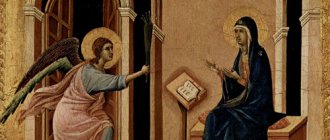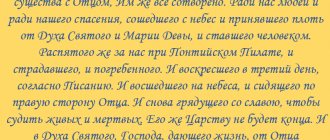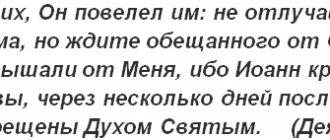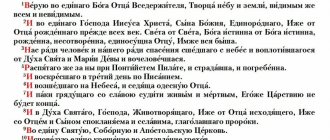The Lord's Prayer (short version)
The Lord's Prayer “Our Father” from Luke is considered an abbreviated version, and supplemented by the full prayer “Our Father” from Matthew, due to the absence of the phrase: “For Thine is the kingdom, and the power, and the glory, forever and ever.” Amen". Biblical scholars are inclined to believe that this sentence is not the original text of Matthew, and therefore was not included in the Gospel of Luke.
Our Father in different languages
In Russian
Our Father, who is in heaven! Hallowed be Thy name, Thy kingdom come; Thy will be done on earth as it is in heaven; Give us this day our daily bread; and forgive us our debts, as we forgive our debtors; and lead us not into temptation, but deliver us from evil.
Prayer Our Father in Ukrainian
Our Father, what is in heaven! Let us sanctify Thy Name. May Thy kingdom come, may Thy will be done, as in heaven so on earth. Give us our daily bread today. And forgive us our sins, as we forgive our transgressors. And do not lead us into mischief, or else deliver us from the evil one. For Thy is the kingdom, and the power, and the glory forever. Amen.
Our Father in Belarusian
Oh ours, as you are in heaven! Hallowed be Thy Name. Prydzi Valadarstvo Tvayo. Thy will be As it is in heaven, so it is on earth. Give us shtodzenny our bread. And we allow our sins, as we allow our sins. Don’t take us to the spacus, otherwise you’ll save us from evil hell. Amen
Prayer Our Father in Romanian
Tatal nostru care esti in ceruri! Sfinteasca-se Numele Tau; Vie imparatia ta; faca-se voia ta, precum in cer si pe pamint. Pinea noastra cea de toate zilele da-ne-o noua astazi si ne iarta noua greselile noastre, precum si noi iertam gresitilor nostri; si nu ne duce in ispita, ci izbaveste-ne de cel rau. Caci a Ta este imparatia si puterea si slava in veci. Amen!
Our Father prayer in Uzbek language
Bizning osmondagi Otamiz! Sening Mukkadas isming uluglansin. Sening Shohliging kelsin. Osmanda bulgani kabi, Erda ham Sening irodang bajo kelsin. Bugungi risk-ruzimizni bergin. Bizga gunoh kilganlarni biz kechirgandek, Sen ham bizning gunohlarimizni kechirgin. Bizni vaswasaga duchor kilmagin, Ammo yavuz shaytondan halos kilgin. Saltonat, kuch-kudrat va shon-shuhrat to abad Senikidir. Omin
Prayer Our Father text in Estonian
Teie palvetage Teie palvetage siis nõnda: Meie Isa, kes sa oled taevas! Pühitsetud olgu sinu nimi! Sinu riik tulgu, Sinu tahtmine sündigu nagu taevas, nõnda ka maa peal! Meie igapäevast leiba anna meile tänapäev! Ja anna meile andeks meie võlad, nagu meiegi andeks anname oma võlglastele! Ja ära saada meid kiusatusse, vaid päästa meid ära kurjast! Aamen.
Prayer Our Father in Latin
Pater noster qui est in caelis: sanctificetur nomen tuum; adveniat regnum tuum; fiat voluntas tua; sicut in caelo, et in terra Panem nostrum cotidianum da nobis hodie; et dimitte nobis debita nostra sicut et nos dimittimus debitoribus nostri; et ne nos inducas in teutationem; Sed libera nos a malo. Quia tuum est regnum, et potestas, et gloria in saecula. Amen
Text of the Lord's Prayer in Spanish
PADRE NUESTRO (ESPAÑOL) Padre nuestro que estás en los cielos. Santificado sea tu nombre. Venga tu reino. Hágase tu voluntad, como en el cielo, asi también en la tierra. El pan nuestro de cada dia, dánoslo hoy. Y perdónanos nuestras deudas, como también nosotros perdonamos a nuestros deudores. Y no nos metas en tentación, mas líbranos del mal; Porque tuyo es el reino, y el poder, y la gloria, por todos los siglos. Amen.
Our Father prayer text in Italian
Padre nostro, che sei nei cieli, sia santificato il tuo nome, venga il tuo regno, sia fatta la tua volontà, come in cielo così in terra. Dacci oggi il nostro pane quotidiano, e rimetti a noi i nostri debiti come noi li rimettiamo ai nostri debitori, e non ci indurre in tentazione, ma liberaci dal maligno.
Download Our Father in German (Deutsch)
Unser Vater in dem Himmel! Dein Name werde geheiligt. Dein Reich comme. Deine Wille geschehe auf Erde wie im Himmel. Unser täglich Brot gib uns heute. Und vergib uns unsere Schulden, wie wir unsern Schuldigern vergeben. Und führe uns nicht in Versuchung, sondern erlöse uns von dem Übel. Denn dein ist das Reich und die Kraft und die Herrlichkeit in Ewigkeit. Amen.
Text of the Lord's Prayer in French
Notre Père, qui es aux cieux, que ton nom soit sanctifié, que ton règne vienne, que ta volonté soit faite sur la terre comme au ciel. Donne-nous aujourd'hui notre pain de ce jour. Pardonne-nous nos offenses, Comme nous pardonnons aussi à ceux qui nous ont offensés. Et ne nous soumets pas à la tentation, mais délivre-nous du Mal. Car c'est à toi qu'appartiennent le règne, la puissance et la gloire, pour les siècles des siècles! Amen.
“Our Father” in English (English)
Our Father, who art in Heaven, hallowed to be Thy Name. Thy Kingdom come, Thy Will be done, on Earth, as it is in Heaven. Give us this day our daily bread, and forgive us our trespasses, as we forgive those who trespass against us. And lead us not into temptation, but deliver us from evil. For thine is the kingdom, and the power, and the glory, for ever and ever. Amen
Our Father in Hebrew
Avinu, shebashamayim - Our Father, in heaven Yitkadesh shimkha - hallowed be Thy Name Tavo malkutekha - may Thy Kingdom come Yease rtzonkha - may Thy will be fulfilled Kabashamayim ken baaretz - as in heaven, also on earth Et lehem hukeinu - our daily bread Ten lanu hayom - give us today Uslyah lanu al khataeynu - and forgive us our debts Kmo shesolhim gam anakhnu - as we forgive Le hotim lanu - those who sin against us Veal tvieinu liyaday nisayon - do not let us fall into the power of temptation Ki im khaltsenu min hara - but save us from evil Ki leha hamamlakha - because Your Kingdom is Vehagvura - and the power of Vehatif'eret - and the glory of Leolmei - forever and ever Amen - Amen
Words of the Lord's Prayer in Greek
PATER imOn - Our Father O en tis Uranis - in heaven AgiastIto to Onoma su - may Your name be sanctified EltAto and vasIlia su - may Your Kingdom come GennetIto to Telima su - may Your will be fulfilled Os en urano ke Epigis - as in heaven and on earth Ton Arton imOn ton epIusion - our daily bread Dos imIn simeron - give us today Ke Afes imIn ta ofeilimata imOn - and leave us our debts Oske imis afikamen - as we left Tis ofIletes imOn - to our debtors k mi isenkis imas is pirasmOn - and do not lead us into temptation Alla rrise imas apo tu poniru - but deliver us from evil
Prayer OUR FATHER
in Bengali, a Hindu dialect (the language of the country BANGLADESH and the Indian state of WEST BENGAL)
Heh Amader Svarger Pita! Tomar nam povitro bole manno hok. Tomar Rajo asuk. Tomar ichchha zhemon svarge temni prithiviteo purno hok. Zhe khaddo amader proyojon ta aj amader dao. Amader kache jara aporadhi, amra jemon tader khoma korechi, temni Tumio amader shob aporadh khoma koro. Amader prolobhone porte dio na, kintu monder hat theke uddhar koro. Raja, let's talk about mahima juge juge Tomar. Amen.
Our Father in Hindi
official language of most Indian states
He hamare svargbasi pita tera nam pavitra kiya jae. Tera rajya ae. Teri iccha jaise svarg men vaise prithvi par puri ho. Hamari dinbhar ki roti aj hamen de. Aur jaise ham apne riniyon ko ksama karte hain taise hamari rinon ko ksama kar. Aur hamen pariksa men mat dal, parantu dust se baca. Kyonki rajya aur parakram aur mahima sada tere hain. Amen.
Our Father in Urdu
(language of Pakistan and Indian Muslims)
Ai hamare bap, tu jo asman par hai tera nam pak mana jae. Teri badshahat ae. Teri marzi jaise asman par puri hoti hai, zamin par bhi ho. Hamari roz ki roti aj hamen de. Aur jis tarah ham apne qarzdaron ko muaf kiya hai, tu bhi hamare qarz hamen muaf kar. Aur hamen azmais men na
Translation of the Lord's Prayer into Russian
Our Father who art in heaven! Hallowed be Thy name; Thy kingdom come; Thy will be done on earth as it is in heaven; Give us this day our daily bread; And forgive us our debts, as we forgive our debtors; And do not lead us into temptation, but deliver us from evil. For Yours is the kingdom and the power and the glory forever. Amen.
In Church Slavonic:
Our Father, who art in heaven! Hallowed be Thy name, Thy kingdom come, Thy will be done, I am in heaven and on earth. Give us this day our daily bread; and leave us to our lies, I to the skin and we leave the debtor to ours; and lead us not into temptation, but deliver us from the bow
In Russian:
Our Father who art in heaven! Hallowed be Thy name; Thy kingdom come; Thy will be done on earth as it is in heaven; Give us this day our daily bread; And forgive us our debts, as we forgive our debtors; And do not lead us into temptation, but deliver us from evil. For Yours is the kingdom and the power and the glory forever. Amen. ( Matt. 6:9-13)
Our Father who art in heaven! Hallowed be Thy name; Thy kingdom come; Thy will be done on earth as it is in heaven; Give us our daily bread; and forgive us our sins, for we also forgive every debtor to us; and lead us not into temptation, but deliver us from evil. ( Luke 11:2-4)
In Greek:
Πάτερ ἡ μ ῶ ν, ὁ ἐ ν το ῖ ς ο ὐ ρανο ῖ ς. ἁ γιασθήτω τ ὸ ὄ νομά σου, ἐ λθέτω ἡ βασιλεία σου, γενηθήτω τ ὸ θέλημ ά σου, ὡ ς ἐ ν ο ὐ ραν ῷ κα ὶ ἐ π ὶ γής. Τ ὸ ν ἄ ρτον ἡ μ ῶ ν τ ὸ ν ἐ πιούσιον δ ὸ ς ἡ μ ῖ ν σήμερον. Κα ὶ ἄ φες ἡ μ ῖ ν τ ὰ ὀ φειλήματα ἡ μ ῶ ν, ὡ ς κα ὶ ἡ με ῖ ς ἀ φίεμεν το ῖ ς ὀ φειλέταις ἡ μ ῶ ν. Κα ὶ μ ὴ ε ἰ σενέγκ ῃ ς ἡ μ ᾶ ς ε ἰ ς πειρασμόν, ἀ λλ ὰ ρυσαι ἡ μ ᾶ ς ἀ π ὸ του πονηρου. Interlinear
In Latin :
Pater noster, qui es in caelis, sanctificetur nomen tuum. Adveniat regnum tuum. Fiat voluntas tua, sicut in caelo et in terra. Panem nostrum quotidianum da nobis hodie. Et dimitte nobis debita nostra, sicut et nos dimittimus debitoribus nostris. Et ne nos inducas in tentationem, sed libera nos a malo.
In English (Catholic liturgical version)
Our Father who art in heaven, hallowed to be your name. Thy kingdom come. Thy will be done on earth as it is in heaven. Give us this day our daily bread, and forgive us our trespasses, as we forgive those who trespass against us, and lead us not into temptation, but deliver us from evil.
Why did God Himself give a special prayer?
“Only God Himself can allow people to call God Father. He granted this right to people, making them sons of God. And despite the fact that they withdrew from Him and were in extreme anger against Him, He granted oblivion of insults and the sacrament of grace.”
The Lord's Prayer is given in the Gospels in two versions, more extensive in the Gospel of Matthew and brief in the Gospel of Luke. The circumstances under which Christ pronounces the text of the prayer are also different. In the Gospel of Matthew, the Lord's Prayer is part of the Sermon on the Mount. Evangelist Luke writes that the apostles turned to the Savior: “Lord! Teach us to pray, just as John taught his disciples” (Luke 11:1).
The Lord's Prayer is part of the daily prayer rule and is read both during Morning Prayers and Bedtime Prayers. The full text of the prayers is given in Prayer Books, Canons and other collections of prayers.
For those who are especially busy and cannot devote much time to prayer, Rev. Seraphim of Sarov gave a special rule. “Our Father” is also included in it. In the morning, afternoon and evening you need to read “Our Father” three times, “Virgin Mother of God” three times and “I Believe” once. For those who, due to various circumstances, cannot follow this small rule, Rev. Seraphim advised reading it in any position: during classes, while walking, and even in bed, presenting the basis for this as the words of Scripture: “whoever calls on the name of the Lord will be saved.”
There is a custom to read “Our Father” before meals along with other prayers (for example, “The eyes of all trust in You, O Lord, and You give them food in due season, You open Your generous hand and fulfill every animal’s good will”).
In Orthodox culture there are many different canons and customs, which for many unbaptized people may seem very unusual. However, the prayer “Our Father” is that same religious address, the words of which are familiar to everyone first-hand.
“Our Father” in Church Slavonic with accents
The classical language of the divine liturgy is Church Slavonic. It is important to preserve this moment in global meaning, that is, in church service.
This is not due to a tribute to traditions, but to the deep connection of historical roots, the preservation of the purity of linguistic culture.
Try to say a swear word in Church Slavonic, you won’t succeed.
In Church Slavonic:
Our Father, who art in heaven! Hallowed be Thy name, Thy kingdom come, Thy will be done, as it is in heaven and on earth. Give us this day our daily bread; and forgive us our debts, just as we forgive our debtors; and do not lead us into temptation, but deliver us from the evil one.
By saying in prayer “who art in heaven” or “he who is in heaven,” the essence of the meaning of the words in this case will not change. But by first learning to read “Our Father” in Church Slavonic with accents, you can sow a seed of knowledge in yourself, which may in the future sprout with an interest in studying the history and culture of your ancestors.
Often in canonical publications the text of the Lord's Prayer is printed with accents. Prayer is the most difficult action in the life of a believer.
It can be compared to musical literacy. You can learn to play an instrument without knowing it, memorize chords or scales. But without knowing the notes, we will no longer be able to write a piece of music, much less tell another person how to play.
In addition, such “mastery” of the instrument is quite limited. Likewise, the text of the prayer “Our Father” is in Russian with emphasis - this literacy makes it possible to emphasize the desired syllable, helping to properly tune in and turn to God, creating a special atmosphere for the sound of the words.
After all, the Holy Scripture says: “In the beginning was the Word...”, thereby the Lord emphasized the power of the significance of words in general.
Lord's Prayer. Our Father
“Our Father, who art in Heaven, hallowed be Your name, Your kingdom come, Your will be done, as it is in Heaven and on earth. Give us this day our daily bread; and forgive us our debts, just as we forgive our debtors; and lead us not into temptation, but deliver us from the evil one.”
INTERPRETATION OF THE OUR FATHER PRAYER
The most important prayer, it is called the Lord’s prayer, because the Lord Jesus Christ Himself gave it to His disciples when they asked Him to teach them how to pray (see Matt. 6:9-13; Luke 11:2-4).
Our Father, who art in heaven! With these words we turn to God and, calling Him Heavenly Father, we call upon Him to listen to our requests or petitions. When we say that He is in heaven, we must mean the spiritual, invisible sky, and not that visible blue vault that is spread over us and which we call heaven.
Hallowed be Thy name - that is, help us to live righteously, holyly and glorify Thy name with our holy deeds.
May Your Kingdom come - that is, honor us here on earth with Your Heavenly Kingdom, which is truth, love and peace; reign in us and rule us.
Let Your will be done as it is in heaven and on earth - that is, let everything be not as we want, but as You please, and help us to obey this Your will and fulfill it on earth as unquestioningly and without grumbling as Her performed, with love and joy, by the holy Angels in heaven. Because only You know what is useful and necessary for us, and You wish us good more than we ourselves.
Give us our daily bread this day - that is, give us for this day, for today, our daily bread. By bread here we mean everything necessary for our life on earth: food, clothing, housing, but most importantly the Most Pure Body and the Honest Blood in the Sacrament of Holy Communion, without which there is no salvation in eternal life. The Lord commanded us to ask for ourselves not wealth, not luxury, but only the most necessary things, and to rely on God in everything, remembering that He, as a Father, always cares and takes care of us.
And forgive us our debts, as we forgive our debtors ( “debts” - sins; “our debtor” - those people who have sinned against us) - that is, forgive us our sins just as we ourselves forgive those who forgive us insulted or offended. In this petition, our sins are called our debts, because the Lord gave us strength, abilities and everything else in order to do good deeds, and we often turn all this into sin and evil and become debtors to God. And if we ourselves do not sincerely forgive our debtors, that is, people who have sins against us, then God will not forgive us. Our Lord Jesus Christ Himself told us about this.
And do not lead us into temptation - temptation is a state when something or someone draws us to sin, tempts us to do something lawless or bad. We ask - do not allow us to be tempted, which we cannot bear, help us overcome temptations when they happen.
But deliver us from the evil one - that is, deliver us from all evil in this world and from the culprit (chief) of evil - from the devil (evil spirit), who is always ready to destroy us. Deliver us from this cunning, crafty power and its deceptions, which is nothing before you.
OUR FATHER - ANSWERS TO QUESTIONS
The Lord's Prayer is also called the Lord's Prayer, because Christ Himself gave it to the apostles in response to their request: “teach us to pray” (Luke 11:1). Today, Christians say this prayer every day in the morning and evening rules; in churches during the Liturgy, all parishioners sing it out loud. But, unfortunately, when we often repeat a prayer, we do not always understand what exactly is behind its words?
"Our Father, who art in heaven"
1. Do we call God Father because He created us all?
No, for this reason we can call Him the
Creator
, or the
Creator
.
The conversion of the Father
presupposes a very definite personal relationship between the children and the Father, which must be expressed primarily in likeness to the Father.
God is Love, therefore our whole life should also become an expression of love for God and for the people around us. If this does not happen, then we risk becoming like those about whom Jesus Christ said: Your father is the devil;
and you want to do the lusts of your father (John 8:44).
The Old Testament Jews lost the right to call God Father. The prophet Jeremiah speaks about this with bitterness: And I said: ... you will call Me your father and will not depart from Me.
But truly, just as a woman betrays her friend treacherously, so you, O house of Israel, have dealt treacherously with Me, says the Lord. …Return, ye rebellious children: I will heal your rebellion (Jer 3:20-22). However, the return of the rebellious children took place only with the coming of Christ. Through Him, God has again adopted all who are ready to live according to the commandments of the Gospel.
Saint Cyril of Alexandria
: “Only God himself can allow people to call God Father. He granted this right to people, making them sons of God. And despite the fact that they withdrew from Him and were in extreme anger against Him, He granted oblivion of insults and the sacrament of grace.”
2. Why “Our Father” and not “mine”? After all, it would seem, what could be a more personal matter for a person than turning to God?
The most important and most personal thing for a Christian is love for other people. Therefore, we are called to ask God for mercy not only for ourselves, but for all people living on Earth.
Saint John Chrysostom
: “...He does not say: “My Father, who art in Heaven,” but “Our Father,” and thereby commands us to offer prayers for the entire human race and never have in mind our own benefits, but always try for the benefits of our neighbor. And in this way he destroys enmity, and overthrows pride, and destroys envy, and introduces love - the mother of all good things; destroys the inequality of human affairs and shows complete equality between the king and the poor, since we all have equal participation in the highest and most necessary matters.”
3. Why “in Heaven” if the Church teaches that God is omnipresent?
God is truly omnipresent. But a person is always in a certain place, and not only with his body. Our thoughts also always have a certain direction. Mentioning Heaven in prayer helps to distract our mind from earthly things and direct it to Heavenly things.
Saint John Chrysostom
: “When God of Heaven speaks,” then with this word he does not imprison God in heaven, but distracts the one praying from the earth.”
"Hallowed be thy name"
4. Why specifically ask for this if God is always holy anyway?
Yes, God is always holy, but we ourselves are not always holy, although we call Him Father. But can children not be like the Father? “Hallowed be your name” is a request that God help us live righteously, that is, so that His name is hallowed through our lives.
Saint John Chrysostom
: “Let him be holy means let him be glorified. God has his own glory, full of all majesty and never changing. But the Savior commands the one who prays to ask that God may be glorified by our life. He said this before: Let your light shine before men, so that they may see your good works and glorify your Father in heaven (Matthew 5:16). … Grant us,” as the Savior teaches us to pray, “to live so purely that through us everyone will glorify You.”
"Thy kingdom come"
5. What kingdom are we talking about? Are we asking God to become a world king?
The Kingdom of God are words that simultaneously mean two concepts here:
1. The state of a renewed world after the end of the world and the Last Judgment, in which people transformed by grace and inheriting this Kingdom will live.
2. The state of a person who, by fulfilling the commandments of the Gospel, has overcome the action of the passions, and through this has allowed the grace of the Holy Spirit to act in himself, which every Christian receives in the sacrament of Baptism.
Saint Theophan the Recluse
: “This kingdom is the future kingdom of heaven, which will open after the end of the world and the terrible judgment of God. But in order to sincerely desire the coming of this kingdom, we must be sure that we will be awarded it along with those to whom it will be said: come, blessed of My Father, inherit the kingdom prepared for you from the foundation of the world (Matthew 25:34). Worthy of this is the one in whom, during this still life, the reign of sin, passions and the devil has been stopped. The suppression of this kingdom is accomplished by the action of grace through faith in the Lord Savior. The believer surrenders himself to the Lord, promising Him to live holy and blameless. For this, in the Sacrament of Baptism, the grace of the Holy Spirit is given, reviving him to new life; from that moment it is no longer sin that reigns in him, but grace, teaching him every good thing and strengthening him to do it. This is the kingdom of grace, about which the Lord said: the kingdom of God is within you. The future kingdom is the kingdom of glory, and this is the spiritual kingdom, the kingdom of grace. The Lord's Prayer embraces both kingdoms together. Otherwise, he who desires the speedy coming of the future kingdom, but has not become a son of the kingdom of grace, will wish for the end of the world to come sooner, and the Last Judgment, at which he will inevitably find himself on the side of those who will hear: depart from me, cursed into eternal fire, prepared for the devil and his angel."
“Thy will be done as it is in heaven and on earth”
6. Doesn’t God carry out His will on earth even without our request?
The will of God is carried out on earth not only by His direct action, but also through us, Christians. If we live according to the commandments of the Gospel, it means we are fulfilling the will of God. If not, then this will will remain unfulfilled in the place where we did not fulfill it. And then - through us - evil enters the world. Therefore, in words, thy will be done
we ask God to protect us from such trouble and direct our lives to fulfill His good will.
St. Augustine
: “Thy will be done as it is in heaven and on earth. Angels serve You in heaven, so may we also serve You on earth. The angels in heaven do not insult You, and let us not insult You on earth. How they do Your will; let us do the same. “And what are we praying for here, if not to be kind to us?” For the will of God then happens in us when we do it; and this means being kind.”
“Give us this day our daily bread”
7.
What do the words “daily bread” and “today” mean?
“Essential” means necessary for our existence; “today” means today. So this is a petition for what we most need at this moment, for today. The word “bread” was understood by the holy fathers here in two meanings: bread as food; and bread as the Eucharist.
Saint Simeon of Thessalonica
: “Although we ask for heavenly things, we are mortal and, like people, we also ask for bread to support our being, knowing that this too comes from You. By asking only for bread, we do not ask for what is superfluous, but only for what is necessary for us for the present day, since we have been taught not to worry about tomorrow, because You care for us today, and you will care for us tomorrow and always.
But give us this day our other daily bread—the living, heavenly bread, the all-holy body of the living Word. This is our daily bread: because it strengthens and sanctifies the soul and body, and whoever eats it will not have life in him, but whoever eats it will live forever (John 6:51-54).”
“And forgive us our debts, just as we forgive our debtors.”
8. Does God forgive sins only to those who have forgiven their offenders? Why shouldn't he forgive everyone?
Resentment and revenge are not inherent in God. At any moment, He is ready to accept and forgive everyone who turns to Him. But remission of sins is possible only where a person has renounced sin, seen all its destructive abomination and hated it for the troubles that sin has brought into his life and into the lives of other people. And forgiveness of offenders is a direct commandment of Christ! And if we, knowing this commandment, still do not fulfill it, then we are sinning, and this sin is so pleasant and important for us that we do not want to give it up even for the sake of Christ’s commandment. With such a burden on the soul it is impossible to enter the Kingdom of God. Only it is not God who is to blame, but ourselves.
Saint John Chrysostom
: “This absolution initially depends on us, and the judgment pronounced on us lies in our power. So that no one who is unreasonable, being convicted of a great or small crime, has any reason to complain about the court, the Savior makes you, the guilty one, a judge over himself and, as it were, says: what kind of judgment do you pronounce on yourself, I am the same judgment I will say about you; If you forgive your brother, then you will receive the same benefit from Me.”
“And lead us not into temptation, but deliver us from evil.”
9. Does God tempt anyone or lead anyone into temptation?
God, of course, does not tempt anyone. But we are not able to overcome temptations without His help. If we, receiving this gracious help, suddenly decide that we can live virtuously without Him, then God takes His grace away from us. But He does this not for the sake of revenge, but so that we can be convinced from bitter experience of our own powerlessness before sin, and again turn to Him for help.
Saint Tikhon of Zadonsk
: “With this word: “Lead us not into temptation,” we pray to God that He may preserve us with His grace from the temptation of the world, the flesh and the devil. And although we fall into temptations, we ask that he does not allow us to be overcome by them, but helps us to overcome and conquer them. From this it is clear that without God's help we are powerless and weak. If we ourselves could resist temptation, we would not be commanded to ask for help in this. By this we learn, as soon as we feel a temptation coming upon us, to immediately pray to God and ask Him for help. From this we learn not to rely on ourselves and our own strength, but on God.”
10. Who is this evil one? Or is it evil? How to correctly understand this word in the context of prayer?
The word wicked
- the opposite in meaning of the word
direct
.
Onion
(as a weapon), from
the beam
of the river, the famous Pushkin's
bow
omorye - all these are words related to the word
onion
in the sense that they denote a certain curvature, something indirect, twisted. In the Lord's Prayer, the devil is called the evil one, who was originally created as a bright angel, but by his falling away from God he distorted his own nature and distorted its natural movements. Any of his actions also became distorted, that is, crafty, indirect, incorrect.
Saint John Chrysostom
: “Here Christ calls the devil evil, commanding us to wage irreconcilable warfare against him, and showing that he is not such by nature.
Evil does not depend on nature, but on freedom. And the fact that the devil is primarily called evil is due to the extraordinary amount of evil that is found in him, and because he, without being offended by anything from us, wages an irreconcilable war against us. That is why the Savior did not say: deliver us from the evil ones, but from the evil one, and thereby teaches us never to be angry with our neighbors for the insults that we sometimes suffer from them, but to turn all our enmity against the devil, as the culprit of all angry." Author: TKACHENKO Alexander
Share:
How to read the Lord's Prayer
God understands only those prayers that, when the person praying says it, understands what he is saying and feeling...
So, whoever says to God in prayer: Thy kingdom come, but does not know how this kingdom comes, not knowing, does not prepare to receive it and does nothing that is required on his part to receive it, is it possible for it to come? this kingdom to him?
What good is it that he says in prayer: Thy kingdom come? The Lord says in the Holy Gospel: repent, for the kingdom of God is drawing near. So, do you want this kingdom to come to you? Repent. If you do not repent, no matter how much you say: Thy kingdom come, it will not come to you.
Venerable Simeon the New Theologian
If you truly call God your Father, then trust in Him as the only Father, all-good, all-powerful, wise, unchangeable in His love and in all perfections.
St. Righteous John of Kronstadt
Read “Our Father”, but do not lie: Forgive us our debts, just as we forgive….
Venerable Ambrose of Optina
...One must pray about this: Firstly, with pure intention - Thy will be done, for I, sincerely desiring to follow it unselfishly, not for the sake of reward or acquisition of anything, and not because You, Lord, have enriched me with bounties With His own He protected me from my opponents, as Satan reproached the righteous Job for this before God (Job.1:9-10), and not out of fear of the eternal torment of Gehenna, but in the simplicity of my heart I follow Your will, I desire what You desire, therefore only that You want it, that this is Your will, my God!
Secondly, you must pray with love: Thy will be done! - I am looking for one thing here and I think one thing, that Thy will be done in everything, Lord! May the majesty of Your name, my God, spread and be glorified through me, Your indecent servant. I consider this alone to be my greatest honor and reward, so that I am worthy to please You, my Creator, Who gave me reason and free will as a guarantee of closest communication with You, my Creator and Savior.
Saint John, Metropolitan of Tobolsk
Hallowed be Thy name... For this we pray that the name of God may be sanctified in us: not because it begins to be holy without being holy, but because in us it becomes holy when we ourselves are sanctified and do what is worthy of what is holy.
Saint Cyril of Jerusalem
To say: Our Father - only those who, by a miraculous birth in Divine Baptism, according to the new and extraordinary law of pregnancy, show in themselves that they are true sons, have the right. And to say: Hallowed be Thy name - those who do nothing worthy of condemnation. And this: Thy kingdom come - those who avoid everything that gives pleasure to the tormentor.
And this: Thy will be done - those who show this by their actions. And this: give us this day our daily bread - those who renounce luxury and extravagance. And this: forgive us our debts - those that forgive those who sin against them. And this: do not lead us into temptation, those who do not plunge themselves or others into it.
And this: deliver us from the evil one - those who wage an irreconcilable war with Satan. And this: for Thine is the kingdom, and the power, and the glory - those who tremble at the words of God and show them in their very deeds. For the knowledge of prayer is successful to the same extent as the character and life of the one who prays is successful.
Venerable Isidore Pelusiot
“Pater noster” (“Our Father”): text, translations, audio
"Pater noster" ("Our Father", or "Lord's Prayer") is the main prayer in the Christian tradition. It is found in the Gospel of Matthew (6:9-13) and the Gospel of Luke (11:2-4). This is the only prayer that Jesus himself suggested.
Text, transliteration of “Pater noster” (“Our Father”)
Pater noster, qui es in caelis, sanctificētur nomen tuum. Adveniat regnum tuum. Fiat voluntas tua, sicut in caelo, et in terrā. Panem nostrum quotidiānum da nobis hodie, et dimitte nobis debĭta nostra, sicut et nos dimittĭmus debitorĭbus nostris. Et ne nos indūcas in tentatiōnem, sed libĕra nos a malo. Amen.
pa'ter no'ster, kwi es in tse'lis, sanktifitse'tur no'men tu'um. adve'niat re'gnum tu'um. fi'at vol'ntas tu'a, si'kut in tse'lyo, et in te'rra. pa'nem no'strum quotidia'num da no'bis ho'die, et dimi'tte no'bis de'bita no'stra, si'kut et nos dimi'ttimus debito'ribus no'stris. et ne nos indu'kas in tentatsio'nem, sed li'bera nos a ma'lyo. a'men.
»» Download the Latin text “Pater noster”:pdfrar
Interlinear translation, liturgical forms of “Pater noster” (“Our Father”)
Interlinear translation
Our father who art in heaven, hallowed be thy name. Let your kingdom come. Let your will be done as it is in heaven and on earth. Give us our daily bread today and forgive us our debts, as we forgive our debtors. And do not lead us into testing, but free us from evil/evil. Amen.
Synodal translation
Our Father who art in heaven! Hallowed be Thy name; Thy kingdom come; Thy will be done on earth as it is in heaven; Give us this day our daily bread; and forgive us our debts, as we forgive our debtors; and lead us not into temptation, but deliver us from evil.
Translation by the Russian Bible Society
Our Father in Heaven, Let Your name be glorified, Let Your kingdom come, Let Your will be done on Earth as it is in Heaven. Give us today our daily bread. And forgive us our debts, just as we forgive those who owe us. Do not put us to the test, but protect us from the Evil One.
Church Slavonic translation
Our Father, who art in heaven! Hallowed be Thy name, Thy kingdom come, Thy will be done, as it is in heaven and on earth. Give us this day our daily bread; and forgive us our debts, just as we forgive our debtors; and do not lead us into temptation, but deliver us from the evil one. Amen.
»» Download Russian translation of “Pater noster”: pdfrar
Belarusian liturgical translations “Pater noster” (“Our Lord”)
Catalic translation
Oisha ours, Cats are in the sky, hallowed is Thy name, come to Thy Valadarship, Thy will be, as in heaven, so on earth. Give us the bread of our shtodzonnaga, and allow us our rights, as we allow our guilt, and do not take us away from the sack, otherwise we will be saved from the hell of evil. Amen.
Interpretation
What is this prayer called?
The Lord's Prayer.
Why is it called the Lord's Prayer?
Because it was given to the apostles, and through them to all of us, by our Lord Jesus Christ Himself (Matthew 6:9-13).
What needs to be said about the merits of this prayer?
It is the most important prayer; That is why it is often read in church during services.
How many parts is the Lord's Prayer divided into?
Into nine parts: invocation, seven petitions and doxology.
How is the invocation read?
Our Father, who art in heaven.
Father - father. Izhe - which. Whoever you are in heaven - who is in heaven, heavenly.
Who is meant here by the word Father?
Our God.
Why does the Lord command us to call on God under the name of the Father?
So that we stand before Him when we pray, not only with fear, as slaves stand before their masters, but also with love and devotion, like children before their father, revealing all their needs to Him with all sincerity and simplicity of heart.
If someone prays alone, do the words change: Our Father?
And in this case, you still need to say: Our Father, because God is the Father common to all of us, and we are brothers among ourselves; because what we ask for ourselves in prayer, we must ask others too.
What do the words show: Who art thou in heaven?
These words show that the person praying makes requests not to the earthly father, who is often unable to help his son, but to the Father living in heaven, Who can do everything for us and is ready to do everything; therefore, praying to the Heavenly Father, we must leave everything earthly and lift up our mind and heart to God.
How is the first petition of the Lord's Prayer read?
Hallowed be Thy name. Yes - let it be. Holy - glorified.
What do we ask of God with these words?
We ask God for help so that we can glorify God with words, deeds, and all our holy lives.
How is the second petition of the Lord's Prayer read?
Thy kingdom come.
What do we ask of God with these words?
We ask that God reign in us, that is, control our spiritual powers and instill in us how to live in order to receive the Kingdom of Heaven. With these words we also ask for the Kingdom of Heaven, that is, the revelation of the perfect bliss of believers.
What is the kingdom of God?
The Kingdom of God is the kingdom of Christian love and grace-filled peace of the soul. Where there is love and harmony between Christians and there is no enmity, there is the kingdom of God; but the kingdom of God will fully open after the second coming of the Son of God to earth.
How is the third petition of the Lord's Prayer read?
Thy will be done as it is in heaven and on earth.
Yako - how.
What do we ask of God with these words?
We ask God to help us fulfill His holy will as willingly and diligently as angels and holy people do it in heaven - always and perfectly in everything.
With these same words, we show complete submission to God, as the Father, who knows better than us which of us needs and benefits for earthly and eternal life.
How is the fourth petition of the Lord's Prayer read?
Give us this day our daily bread.
Daily - enough for a day. Give it - give it. Today - to this day.
What do we ask of God with these words?
We ask God to give us everything we need in life for body and soul.
What is necessary for body and soul?
The body needs: food, clothing and shelter. The soul needs: holy communion (John 6:55) and other sacraments and the word of God (Matthew 4:4).
Just as a body, if it is deprived of its food, will die, that is, it will lose its soul and be destroyed, so the soul, if it does not feed on its own food, will die, that is, it will be deprived of eternal bliss.
Why is it commanded to ask for daily bread only for one day?
So that we do not worry too much about future days; but we would remember that God Himself cares for us more than we do, and we would firmly trust in Him (Matthew 6:25-33).
How is the fifth petition of the Lord's Prayer read?
And forgive us our debts, just as we forgive our debtors.
Leave - forgive. Debts are sins. Like - just like.
What do we ask of God with these words?
We ask that God forgive us our sins, just as we forgive those who have offended us or those who have sinned against us.
Why are sins called debts?
Because everything we have is not ours, but God’s, and we must use everything according to the will of God; if we don’t do this, if we sin, then we remain, as it were, in debt to God.
Who are our debtors?
People who insult us and do harm to us. They are called our debtors because they should live with us, just as we do with them, in peace and harmony, but they do not.
Will God forgive us our sins if we ourselves do not forgive others?
In this case, God will not forgive us our sins. Therefore, when we ask God for forgiveness of our sins, when we pray to Him, we should not have enmity with anyone, but have peace and love with everyone (Matthew 5:23-24, 6:14-15).
How is the sixth petition of the Lord's Prayer read?
And do not lead us into temptation.
Temptation is circumstances under which one can deviate towards sin.
What do we ask of God with these words?
We ask God to remove us from such incidents in life that lead us to sin.
How is the seventh petition of the Lord's Prayer read?
But deliver us from evil.
What do we ask of God with these words?
We ask that God deliver us from all misfortunes and sorrows, and especially from the cunning devil, who constantly tempts us to evil (1 Pet. 5:8).
How is the doxology of the Lord's Prayer read?
For Yours is the kingdom and the power and the glory forever. Amen.
Why is praise added to prayer?
So that during prayer we not only ask God for mercy, but at the same time glorify Him as our Creator, firmly hoping that He is always able and ready to fulfill our request; as a sign of which we add to the doxology the word: Amen. (see commentary by Priest K. Parkhomenko)
How are the above prayers usually called: Glory to Thee, God... Heavenly King... Holy God... Glory to the Father... Holy Trinity... Our Father...?
Beginning or initial, because almost all church services begin with them; With them we begin a series of home morning and evening prayers.
Interpretation of the Lord's Prayer
The origin of “Who art in heaven” has a long, centuries-old history. The Bible mentions that the author of the Lord's Prayer is Jesus Christ himself. It was given to them while he was still alive.
During the existence of the Lord's Prayer, many clergy have expressed and continue to express their opinions about the main meaning that is set out in this prayer. Their interpretations are comparatively different from each other. And first of all, this is due to the fact that the content of this sacred and thoughtful text contains a very subtle, but at the same time important philosophical message, which can be perceived by each person in completely different ways. Moreover, the prayer itself is quite short compared to others. Therefore, anyone can learn it!
The Lord's Prayer is composed in such a way that its entire text has a special structure in which sentences are divided into several semantic parts.
- The first part talks about glorifying God. While pronouncing it, people turn to the Almighty with all recognition and respect, thinking that this is the main savior of the entire human race.
- The second part involves individual requests and wishes of people directed to God.
- A conclusion that concludes the prayer and conversion of the believers.
Having analyzed the entire text of the prayer, an interesting feature is the fact that during the recitation of all its parts, people will have to turn with their requests and wishes to God seven times.
And in order for God to hear requests for help and be able to help, it would do well for each person to study detailed information with a detailed analysis of all three parts of the prayer.
"Our Father"
This phrase makes it clear to the Orthodox that God is the main ruler of the Kingdom of Heaven, to whom the soul must be treated in the same way as one’s own father. That is, with all the warmth and love.
Jesus Christ, when he taught his disciples to pray correctly, spoke about the need to love the Father God.
"Who is in heaven"
In the interpretation of many clergy, the phrase “He who is in heaven” is understood in a figurative sense. So, for example, in his reflections John Chrysostom presented it as a comparative phrase.
Other interpretations say that “He who is in heaven” has a figurative expression, where heaven is the personification of any human soul. In other words, God's power is present in everyone who sincerely believes in it. And since the soul is usually called human consciousness, which does not have a material form, but at the same time it (consciousness) exists, then, accordingly, the entire inner world of the believer in this interpretation appears as a heavenly form, where God’s grace also exists.
"Hallowed be thy name"
It means that people should glorify the name of the Lord God by doing good and noble deeds, without violating all the commandments of the Old Testament. The phrase “Hallowed be thy name” is original and was not replaced when translating the prayer.
"Thy kingdom come"
Biblical legends say that during the life of Jesus Christ, the kingdom of God helped people overcome suffering, cast out evil spirits, including the power of demons, heal the sick body from all kinds of diseases, creating conditions for a wonderful and happy life on earth.
But over time, a huge number of people still turned out to be unable to protect themselves from dirty temptations, discrediting and denigrating their weak-willed souls with artificial temptations. Ultimately, the lack of humility and flawless adherence to one's own natural instinct turned most of society into wild animals. It must be said that these words have not lost their originality to this day.
"Thy will be done"
The point is that there is no need to be afraid of the power of God, since he knows better how the fate of each person should turn out: through work or pain, joy or sadness. No matter how unpleasant our path is filled with circumstances, it is important that with God’s help it always makes sense. These are perhaps the most powerful words.
"Our Bread"
These words are full of mystery and complexity. The opinions of many clergy agreed that the meaning of this phrase is due to the constancy of God. That is, he must protect people not only in the most difficult moments, but also in other cases, always staying with them. It is very important to learn these words by heart.
"And leave us our debts"
You need to learn to forgive the sins of loved ones and strangers. Because only then will all your own vices be forgiven.
"And do not lead us into temptation"
This means that people ask God to create on the path of life those difficulties and obstacles that we are able to overcome. For everything beyond one’s control is capable of breaking the human soul and losing one’s faith, exposing every person to temptation.
"But deliver us from evil"
Everything is clear here. We ask God for help in the fight against evil.
You can print out the Lord's Prayer on paper before going to church.
It is important to note that all the words presented above are presented in modern Russian, which are translations from the ancient church language.
At home, the Lord's Prayer is read in the morning and at night before going to bed. And in the temple you can turn to God at any time.
In Church Slavonic: O our father, who art in heaven! Hallowed be Thy name, Thy kingdom come, Thy will be done, as it is in heaven and on earth. Give us this day our daily bread; and forgive us our debts, just as we forgive our debtors; and lead us not into temptation, but deliver us from the evil one (Matthew 6:9-13).
In Russian: Our Father who is in heaven! Hallowed be Thy name, Thy kingdom come; Thy will be done on earth as it is in heaven; Give us this day our daily bread; and forgive us our debts, as we forgive our debtors; and lead us not into temptation, but deliver us from evil. (See also: Explanatory Orthodox prayer book. The Lord's Prayer “Our Father”)
How to correctly read the Lord's Prayer
Any appeal to God is a message that should convey a depth of understanding of one’s own feelings. The clergy believe that those “Our Father” prayers that are spoken with the fulfillment of this condition will be heard. The foundations on which the person praying must rely:
- when turning to the Heavenly Father, one must believe that the request is really directed to the Father - the only, omnipotent one, as if all hope remains only on him; the Lord must be perceived as the final authority when addressing;
- when the line “Thy kingdom come” is spoken, it is also important to give the correct message: it is necessary to repent of your sins in order to get into the Kingdom of God, according to the Monk Simeon, the lack of understanding of these lines means a lack of understanding of how to prepare for the coming of the Kingdom of Heaven, which reduces no prayer;
- lying is unacceptable when making an appeal, and often the person asking is deceived or disingenuous, it is important to understand that prayer is not just words, but a broadcast of one’s inner state (faith, love, humility in making a decision, received from a soul turned to God), falsehood when this will not allow you to get the desired result, you will be left with a feeling of emptiness and disbelief, since the miracle did not happen, the release of energy when reading the prayer did not occur;
- Orthodox prayer, according to Metropolitan St. John of Tobolsk, should be selfless; for Catholics, Baptists, and Muslims this rule also applies, and when praying, one must ask the Lord to send down the understanding that love for the Almighty is above all else, and requests should come in second place so that there is work and money, health.
When reading the prayer, it is necessary to internally renounce the worldly, to draw your soul closer to the Divine.
According to the Monk Isidore Pelusiot, those who by their actions and thoughts show that they are worthy of being called “Son of God” have the right to pray when they turn to the Most High Father.
Listen to the Lord's Prayer online
To understand the meaning of the “Our Father” prayer, its power, and correct reading, it is important to systematically pray on your own and know this appeal to the Almighty. Perhaps at the beginning of churching, when a person does not yet know a single prayer, reading will occur mechanically, without a deep understanding of the text. Therefore, in order not to lose the desire to pray, to feel the words of prayer in your heart, you can listen to the prayer “Our Father” performed by choirs, written by great Russian composers.
• P. I. Tchaikovsky
• S. V. Rachmaninov
• P. G. Chesnokov
• I. F. Stravinsky
The words of any prayer are designed to warm the heart of the person praying, to attune him to internal, spiritual strength. Through listening to music this process occurs faster.
Why is the Lord's Prayer read 40 times?
There is an opinion that 40 is a sacred number:
- The fast lasted 40 days, after which, according to the tradition of the Church, the prophet Moses learned the special Divine gift of grace-filled help; he was honored to talk with God on Mount Sinai and receive from Him the tablets of the law;
- the Israelites reached the promised land after forty years of wandering;
- Jesus Christ ascended into heaven on the fortieth day after His resurrection;
- Taking all this as a basis, the Church established the commemoration on the fortieth day after death, so that the soul of the deceased would ascend the holy mountain of Heavenly Sinai, be rewarded with the sight of God, achieve the bliss promised to it and settle in the heavenly villages with the righteous;
- Christ fasted for 40 days in the desert, in honor of which Great Lent lasts 40 days;
- 40 days - the time that passed between the Resurrection of Christ and his Ascension;
- The dome of the main Orthodox church in the world, the Byzantine Hagia Sophia in Constantinople, had 40 “airy” circular windows.
Prayer Our Father for children: how to teach a child
How to teach a child the Lord's Prayer? The best place to start is with an explanation. It is necessary not to impose on the child a strict imperative in prayer: “Like, you have to and that’s it,” “Read from here to here until you finish reading, you don’t leave the room,” no.
God doesn't like violence. You should explain, guided by the experience of the Church, the holy fathers, and your personal life, why you need to pray. Who is the Lord? Why is He invisible? Why does he hear our prayers? It is important to answer the child’s questions and adapt to his perception of the world, including prayers.
For preschool children, for example, it may be enough to teach them how to cross themselves correctly. And explain what the sign of the cross is. Learn to kiss icons. Sometimes it’s enough just to bring them or bring them to the temple, show the icon and say: “God!” And from this their personal journey in the Orthodox faith will begin. Teach your baby to wear a cross.
So, for example, a morning or evening prayer rule for a child may consist of a “cap,” that is, the beginning: “In the name of the Father and the Son and the Holy Spirit. Amen". In this case, less is more. Let the child read less, but with heartfelt attention, rather than more, but with anguish and irritation.









